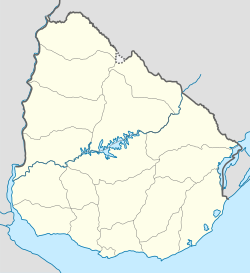Vergara is a small city in the Treinta y Tres Department of eastern Uruguay.
Vergara | |
|---|---|
City | |
 | |
| Coordinates: 32°57′0″S 53°56′0″W / 32.95000°S 53.93333°W | |
| Country | |
| Department | |
| Population (2011 Census) | |
| • Total | 3,810 |
| Time zone | UTC -3 |
| Postal code | 33002 |
| Dial plan | +598 4458 (+4 digits) |
Geography
editIt is located between Route 18, which passes to the northwest, and on Route 91, which passes to the southeast, and about 54 kilometres (34 mi) northeast of Treinta y Tres, the capital city of the department. The stream Arroyo Parao flows along the northeast limits of the town.
History
editBetween 1877 and 1887, José Fernandes Vergara, of whom the city is named after, bought from his sister-in-law Luisa Ignacia Saravia the fields intended for the founding of the town. At the time, it was known as Parao, since it was on the right bank of the Arroyo Parao. In April 1891, after surveyor Manuel Coronel divided the land, Vergara made the first sales.[1]
Between 1890 and 1900, immigrants from different European countries began to arrive in the area, but especially from Italy. At the same time, existing ranch hands were displaced due to the construction of fencing around fields.[2]
On 10 March 1903, the group of houses here was declared a "Pueblo" (village) by the Act of Ley Nº 2.788.[3] On 13 December 1994, its status was elevated to "Ciudad" (city) by the Act of Ley Nº 16.668[4]
Population
editIn 2011, Vergara had a population of 3,810.[5]
| Year | Population |
|---|---|
| 1963 | 2,837 |
| 1975 | 2,826 |
| 1985 | 3,379 |
| 1996 | 3,983 |
| 2004 | 3,985 |
| 2011 | 3,810 |
Source: Instituto Nacional de Estadística de Uruguay[3]
Places of worship
editReferences
edit- ^ "Vergara, ayer, - Memorias Vergarenses". 2016-01-20. Archived from the original on 2016-01-20. Retrieved 2024-05-14.
- ^ "Vergara, ayer, - Memorias Vergarenses". 2016-01-20. Archived from the original on 2016-01-20. Retrieved 2024-05-14.
- ^ a b "Statistics of urban localities (1963–2004)" (PDF). INE. 2012. Archived from the original (PDF) on 13 November 2009. Retrieved 6 September 2012.
- ^ "Ley Nº 16.668". República Oriental del Uruguay, Poder Legislativo. 1964. Archived from the original on 28 March 2016. Retrieved 6 September 2012.
- ^ "Censos 2011 Cuadros Trenta y Tres". INE. 2012. Archived from the original on 10 October 2012. Retrieved 25 August 2012.
External links
edit


